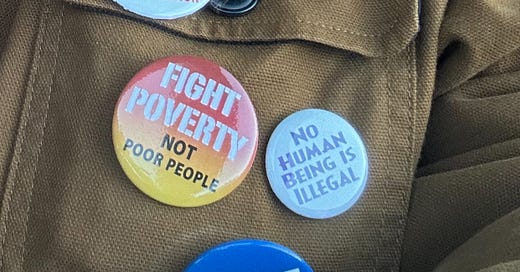A guy in an Airborne Ranger cap stops me in the supermarket Saturday. I was wary. We’ve been conditioned to be suspicious of others’ politics, especially when the others’ dress or appearance seems to signal a belief system at odds with our own.
He asks about the five buttons on my jacket, especially the one that has the word “peace” in Arabic, Hebrew and English.
“You’re a big activist,” he says.
“A small one,” I answer. I’m stunned. Unsure how this is going to play out.
He points to the peace button, asks what it says. I tell him.
“You’re against the war in the Middle East?”
“Yes.”
“What about the occupation. The West Bank and Gaza.”
“I am very opposed to the occupation.”
“At least you’re consistent,” he said and thanked me for stopping, and continued his shopping.
It was a surprising encounter, given the tenor of the times. I was suspicious and I suspect he was. He offered nothing about his own beliefs, was genuinely interested in what I had to say.
I should’ve spent more time, but I didn’t. I should’ve asked him his thoughts, and I’m not sure why I didn’t. I think I was stunned. Unprepared. I’m a journalist but those instincts failed to kick in.
I could see this as a brief, perhaps meaningless encounter. But that feels like the wrong take. Rather, it says something about how quickly I — and all of us — jump to conclusions. We should be able to discuss these things, to debate politics (as opposed to talk teach other.
It reminds me of what I tell students when I teach the essay: the goal is not conversion, but conversation. All we should be striving for is understanding.




